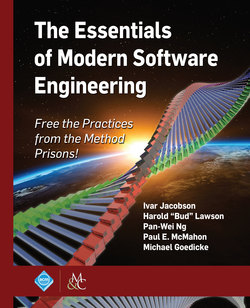Читать книгу The Essentials of Modern Software Engineering - Ivar Jacobson - Страница 9
На сайте Литреса книга снята с продажи.
ОглавлениеForeword by Grady Booch
The first computers were human; indeed, the very noun “computer” meant “one who computes or calculates” (and most often those ones were women).
My, how the world has changed.
Computing has woven itself into the interstitial spaces of society. Softwareintensive systems power our cars and airplanes; they serve as our financial conduits; they track our every action; they fight our wars; they are as intimate as devices we hold close to us or even within us and as grand as the wanderers we have flung into space and that now inhabit other planets and venture to other stars. There is no other invention in the history of humanity that has such a potential to amplify us, diminish us, and perhaps even replace us.
I have often observed that the entire history of software engineering can be characterized as the rising levels of abstraction. We witness this in our programming languages, in our tools, in our frameworks, in the very ways with which we interact with software-intensive systems … and even in the ways in which we craft these systems. This is the world of software engineering methods.
I am proud and humbled to call myself a friend of Ivar Jacobson. The two of us, along with Jim Rumbaugh, were at the center of a sea change in the way the world develops and deploys software-intensive systems. We got some things right; we got some things wrong. But, most important, we helped to codify the best practices of software engineering in their time. Indeed, that was an incredibly vibrant time in the history of software engineering, wherein many hundreds if not thousands of others were struggling with how to codify the methods by which systems of importance could best be built.
The nature of software development has changed—as it should and as it will again—and even now we stand at an interesting crossroads in the field. Agile methods have proven themselves, certainly, but we are at the confluence of technical and economic forces that bring us again to a very vibrant point in time. As the Internet of Things brings computing to billions of devices, as computational resources grow in unceasing abundance, and as deep learning and other forms of artificial intelligence enter the mainstream, now is the time to establish a sound foundation on which we can build the next generation of software-intensive systems that matter.
In a manner of speaking, one might say that the essence of Essence is its powerful mastery of the fundamental abstractions of software engineering. I saw in Ivar the seeds of Essence in the early days of working with him and Jim on the UML, and so now it is wonderful to see this work in its full flowering. What you hold in your hands (or on your computer or tablet, if you are so inclined) represents the deep thinking and broad experience of Ivar; information that you’ll find approachable, understandable, and—most importantly—actionable.
Enjoy the journey; it will make a difference for the good.
Grady Booch
IBM Fellow, ACM Fellow, IEEE Fellow, recipient of the BCS Ada Lovelace Award, and IEEE Computer Pioneer.
